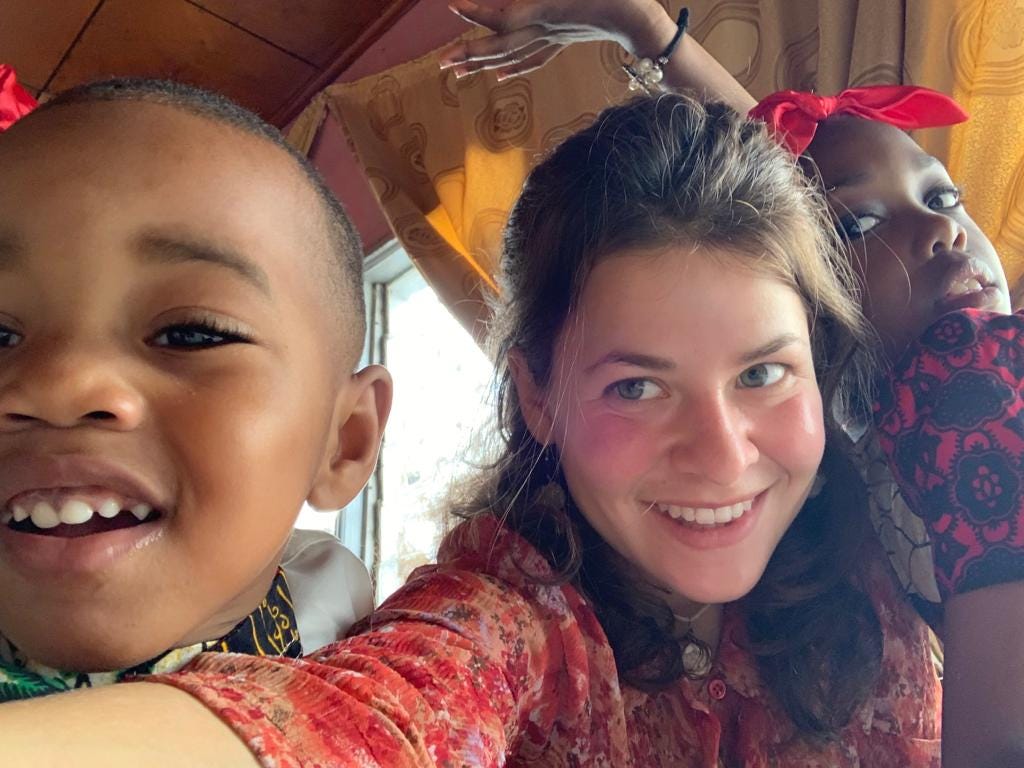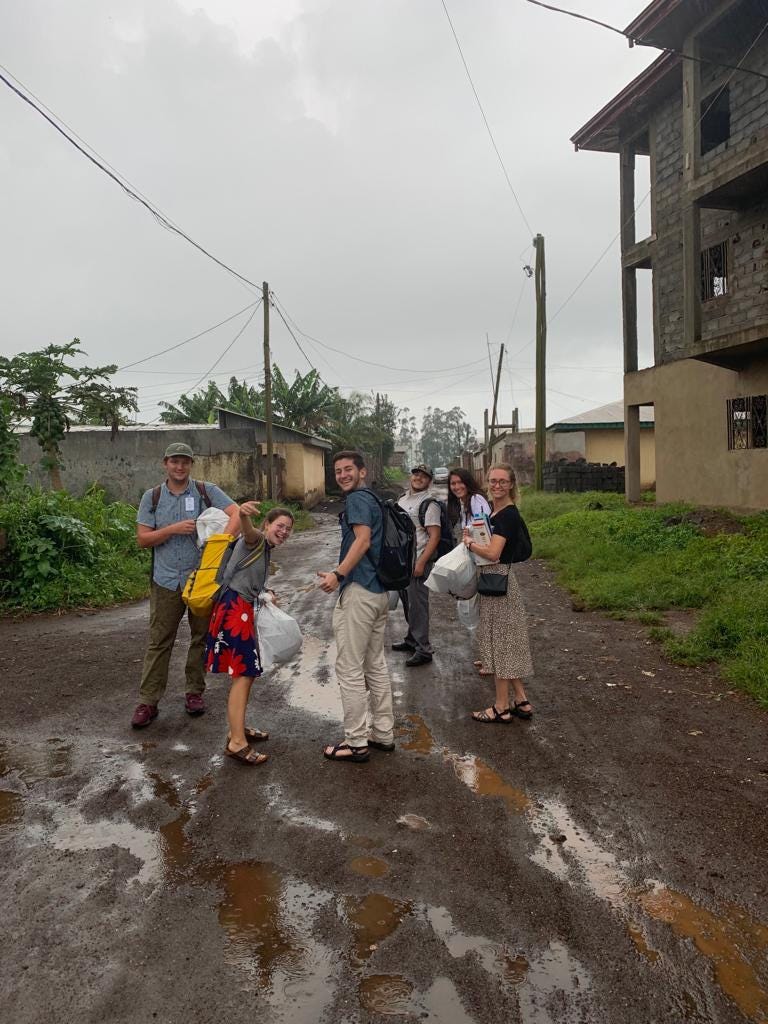A Peace Corps Trainee Checks In On Social Media From Cameroon

PC CAMEROON UPDATE
I’ve been meaning to write this for a while but wanted to do it right — it’s difficult to describe this country and the past two weeks. It has felt like an entire lifetime, an almost magical realism-esque blur of time and space where everything is so different and yet in ways so similar.
Yesterday morning I woke up at the crack of dawn, grabbed my bucket full of my damp laundry and brought it outside to the clothes lines. I had taken my clothes inside the night before due to the pounding rain that occurs almost nightly, hot and intense thunderstorms that turn the roads to a mix of mud and puddles. My homestay family thinks it is cold during the rainy season. They all bundle up in winter coats and make sure that I am wearing my flip flops in the house at all times, so my feet don’t get cold. I laugh whenever they tell me this and try to describe chicago winters in my broken french, but words like “snow” are not a part of the daily vocabulary here.

As I hung my up my clothes, the smallest child Denzel came out to help. He is 2, and does whatever chores he can, just like the girls who have been up since 5:00 am cleaning the house. It is an every day occurrence — they dutifully listen to their mothers calls, fetch water from the spout outside, sweep the floors and clean them with a wet rag. There are no complaints or question of the work itself.
Denzel brought me my wet shirts and pants, holding them up with a small toothy smile and saying “ah” so I knew he was there. I thanked him quietly each time. I have seen him cry only very rarely — when he falls or hurts himself, he smiles and laughs. I asked my 9 year old sister Azaria why, and she told me simply “he is not allowed to cry.”
Nothing comes “easily” here. All water is collected from a well or from a tap outside, sometimes relatively far away from the home. Any water needed to drink or brush your teeth must be filtered first. Laundry is done outside in a bucket by hand, scrubbing at the folds in the fabric until Maman has deemed it clean enough. Showers are taken by boiling water and mixing in cold water, and using a small cup out of the bucket to wash. You can have clothes made for you in the market — I bought fabric and went to the local seamstress who lives next door. She is currently making me a pair of colorful overalls.
Cockroaches and mice are regular acquaintances in my room and in the kitchen. I sleep every night under a mosquito net. Each night after dinner I take a pill for malaria, and each morning I take a multivitamin. The electricity goes out most nights — when the lights go off, I bring out my solar powered lamps and the girls take my speaker and insist on a dance party with American music. When the electricity returns, Denzel runs around in circles screaming “Hallelujah!” before collapsing in a fit of giggles.
Walking down the street here is a sensory overload. Every single person I pass looks up from what they are doing and stares. They yell “la blanche” or “le petite blanche” at me as I walk, though for them it isn’t rude to point out these differences. Many will say hello, mostly in french though occasionally in english, and if you smile at them they will almost always smile and wave back. Shops and stands run haphazardly down the main road, with meat cooking and fish sitting out in the sun being eaten by flies. Motos and cars drive down the main road seemingly randomly, almost colliding into each other and pedestrians. They act like taxis here, and we are allowed to take them for a small fee, though the women volunteers are taught not to touch the drivers but to hold on to the back of the moto for support.
It can be quite difficult to be a female volunteer here. Women are very clearly seen as inferior. The woman of the house does the chores and cooks the dinner while the man sits on the couch. He never thanks her. Though I have not yet seen it, domestic abuse and child abuse is supposedly common. Cheating or polygamy by the husband is considered not only normal but not worthy of complaint from his wife. In the villages, many women cannot speak unless they receive permission from their husbands, and they cannot leave the house. Children ages 13 are getting married and having babies.
Harassment is common too, where strangers will ask female volunteers to marry them, or else call them beautiful and try to touch them. We carry knives or mace, and often volunteers will opt to wear a ring and tell such strangers that they are already married. We are told not to smile at men, as it is seen as inviting and promiscuous. We are told to dress conservatively, covering our shoulders and our knees. We are told that we must develop a tough outer skin over the next two years if we are to survive such occurrences. Be polite, yet firm. Remember that your opinions are valued, your thoughts matter, your intelligence is important.
My cohort of trainees is amazing. Everyone has a story to tell or something interesting to say, and everyone is exceptionally kind. We study from 8:00 am to 5:00 pm every day, french classes and health classes and community organizing classes. We often hang out after class at a local boulangerie, or a place called “Prison Bar,” so named because it is directly attached to the local jail. The bartender is an old man with a warm smile; he tells us to call him Papa Prison.
Once we get to our sites in December, we are almost entirely on our own. Most volunteers are alone at their sites, in order to fully integrate within their community. Often we are “opening” a site, which means that we are the first PC volunteer in that village. The first 3 months are spent observing, meeting people, gaining their trust, learning about what they actually need from us rather than what we think they might need. The teachers stress this last point every day — that our work here is not to change any cultural aspect, but to work within the resources they have, and try to spread objective awareness about women’s health issues and child nutrition. For example, women in the villages will often feed their 2 month old babies water from the tap rather than breastfeeding, resulting in a high infant mortality. The work itself is highly unstructured — we are supposed to figure out ways to discuss these problems, like organizing meetings with the midwives, or going door to door to talk about health issues at the individual level. My french has been slowly improving, though I may also need to learn Fulfulde starting week 5 if I get placed in the Adamawa region. Most of the women there do not go to school and so do not speak french, only Fulfulde.
Every day has offered me new insight into the culture and the country. I don’t know if I have ever been this happy! I will try to keep writing as much as possible. Sending all my love back home
Love, Sash





No comments yet.
Add your comment